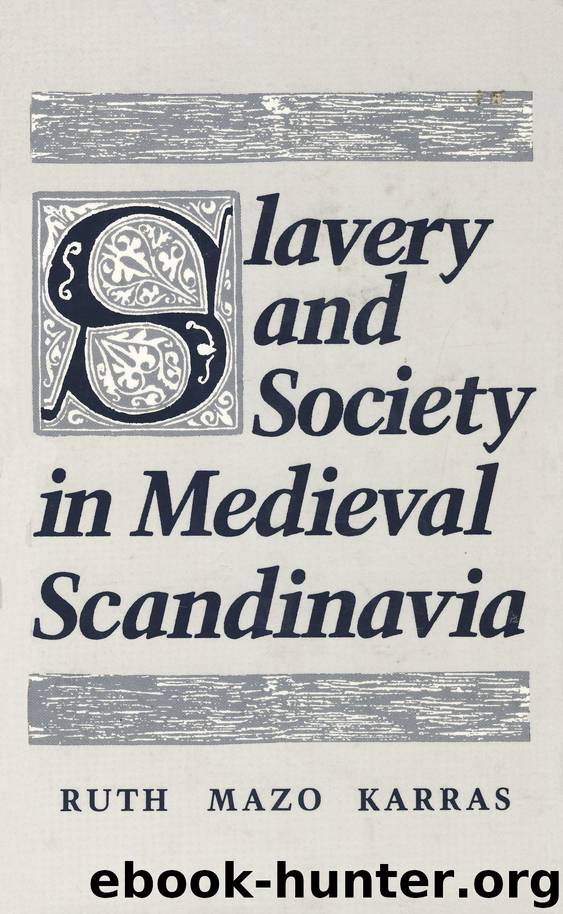2020-02-17 08:31:36.525142 by Unknown

Author:Unknown
Format: epub
Published: 2015-07-12T16:00:00+00:00
162
cept, if it derived from the imposition of Roman law categories on medieval situations where they did not really fit, slavery would be an imaginary construct hardly worth discussing. Even if Roman law did heavily influence Scandinavian laws on slavery, however, this does not make them meaningless or the institution nonexistent. Slavery's implications for the lower levels of free society were not only economic but also ideological. It allowed the myth of the independence and full rights of all free men. The Scandinavian law codes' picture of this group of rightless people may or may not be an accurate reflection of how society actually treated slaves, but it does indicate that the lowest social classes could be categorized as largely rightless property that belonged to, not in, the community. By making slavery a clearly marked status, the law codes threw into relief the peasant's legal and political freedom, his freedom from personal dependence even when he was economically dependent, and his full membership in the community even if he wielded no effective power. The slave-free dichotomy in the laws made the nonslave free.179
By the thirteenth century it was becoming less necessary to pretend that all nonslaves were in the same class. The hereditary nobility was exempt from taxes. Many former peasant proprietors, while remaining juridically free, had lost their land. It was clear that they were not all independent and equally free and it was no longer necessary to emphasize that they were by declaring those at the low end totally rightless. Freedom had come to mean the possession of specific privileges and the absence of specific obligations. Peasant or commoner, not slave, was coming to be the opposite of free [fræls), so slavery as a legal institution was no longer necessary to give meaning to the concept of freedom.180
Increased social differentiation among the free was a cause, not a result, of the end of slavery as a juridical category and as an abstract concept. The Church did not promote the abolition of slavery, though it may have encouraged manumission; landlords may have preferred other forms of labor to slaves or found that domiciling slaves increased their profits, but these economic factors need not have led to the ending of slavery as a juridical status. Economic forces did play a role: without an economic need for direct exploitation slaveowners would no longer have opposed religiously motivated manumission. As unfreedom was no longer necessary to the exploitation of labor—as landowners divided the land among tenants, who could just as well be free as unfree, or as households hired free labor—it also became unnecessary as a juridical institution.
Download
This site does not store any files on its server. We only index and link to content provided by other sites. Please contact the content providers to delete copyright contents if any and email us, we'll remove relevant links or contents immediately.
Evelina by Fanny Burney(26493)
The Secret History by Donna Tartt(18059)
Who'd Have Thought by G Benson(16121)
Eleanor and Park by Rainbow Rowell(15068)
All the Missing Girls by Megan Miranda(14531)
A Web of Lies 27 by Bella Forrest(13515)
Fallen Heir by Erin Watt(13146)
The Cruel Prince (The Folk of the Air Book 1) by Holly Black(11980)
Shadow Children #03 - Among the Betrayed by Margaret Peterson Haddix(11574)
Twisted Palace by Erin Watt(10804)
Warriors (9781101621189) by Young Tom(10270)
Simon vs. the Homo Sapiens Agenda by Becky Albertalli(10012)
Caraval Series, Book 1 by Stephanie Garber(9858)
La Belle Sauvage by Philip Pullman(9840)
Six of Crows by Leigh Bardugo(9637)
They Both Die at the End by Adam Silvera(9434)
P.S. I Still Love You by Jenny Han(9283)
Fangirl by Rainbow Rowell(8757)
A Girl in a Million by Betty Neels(8345)
